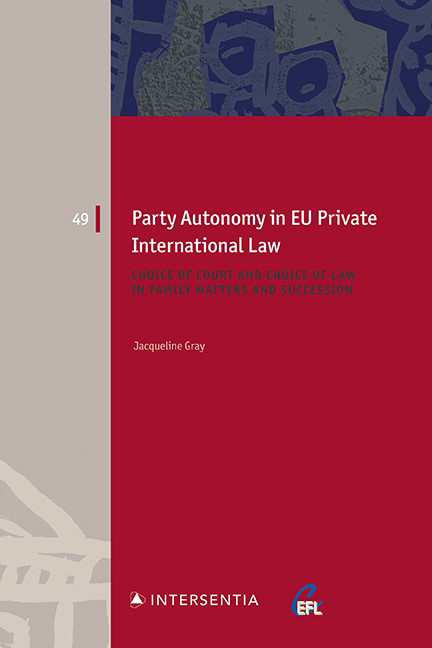 Party Autonomy in EU Private International Law
Party Autonomy in EU Private International Law Published online by Cambridge University Press: 25 May 2021
INTRODUCTION
The previous chapter has delineated the subject matter (material and personal scope) of the instruments that allow for party autonomy in the EU‘s private international law rules relating to family matters and succession. Before embarking upon an examination into the precise connections through which a choice can be made in those contexts, it is also necessary that the ‘focus‘ of the choice at hand is established.
For the present purposes, this focal point is either the competent Member State court or the applicable national law that applies to a particular matter or proceeding. The parameters of these elements within the context of the EU private international law rules on family matters and succession will be established and contrasted in the following sections (‘court‘ – 5.2. and ‘applicable law‘ – 5.3.).
This examination will follow the format of the previous chapter in presenting this evaluation in a synthesis (5.4.), which will present the findings on the delineation of the focal points, the coordination and interaction between related subject matter in this particular context, and the gaps to be addressed.
COURT
The first of the two focal points upon which party autonomy is based is that of the ‘court‘: the authority that applies the law and pronounces a decision on the matter at hand. This section will begin by outlining the general definition of ‘court‘ as set out in the relevant instruments concerning property relations, maintenance, parental responsibility and succession (5.2.1.), before delving further into issues that arise from these provisions, namely: the scope permitted for the inclusion of non-judicial authorities by the respective instruments (5.2.2.); the procedural guarantees and requirements that are imposed upon the functioning of these bodies (5.2.3.); the question of whether religious or other private authorities (5.2.4.) or arbitral tribunals (5.2.5.) are to be viewed as decision-making bodies within the scope of the relevant regulations; and finally, the requirement for Member States to notify the Commission regarding the presence of non-judicial bodies in their jurisdictions (5.2.6.).
To save this book to your Kindle, first ensure [email protected] is added to your Approved Personal Document E-mail List under your Personal Document Settings on the Manage Your Content and Devices page of your Amazon account. Then enter the ‘name’ part of your Kindle email address below. Find out more about saving to your Kindle.
Note you can select to save to either the @free.kindle.com or @kindle.com variations. ‘@free.kindle.com’ emails are free but can only be saved to your device when it is connected to wi-fi. ‘@kindle.com’ emails can be delivered even when you are not connected to wi-fi, but note that service fees apply.
Find out more about the Kindle Personal Document Service.
To save content items to your account, please confirm that you agree to abide by our usage policies. If this is the first time you use this feature, you will be asked to authorise Cambridge Core to connect with your account. Find out more about saving content to Dropbox.
To save content items to your account, please confirm that you agree to abide by our usage policies. If this is the first time you use this feature, you will be asked to authorise Cambridge Core to connect with your account. Find out more about saving content to Google Drive.